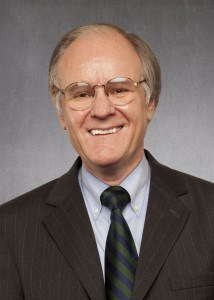 Institute for Enterprise Ethics panel debates corporate responses to voting legislation
Institute for Enterprise Ethics panel debates corporate responses to voting legislation
Opening themselves up to a spectrum of political criticism, a number of CEOs have recently voiced opinions on some portion of this year’s wave of 361 voting rights-related bills proposed in 47 states. Their statements and the responses they generate have elevated a key issue: How involved should business be in social justice and political matters?
“It is a difficult time for corporations to stay neutral, but (effectively voicing an opinion) is the kind of an ideal that’s increasingly hard to meet,” said Don Mayer, professor of the practice in Daniels Department of Business Ethics and Legal Studies.

Don Mayer
Mayer recently joined two departmental colleagues—John Holcomb, professor, and Tricia Olsen, associate dean for undergraduate programs, the Marcus Faculty Fellow and associate professor—for the annual Institute for Enterprise Ethics panel discussion. Meeting via Zoom, the trio respectfully offered a broad range of viewpoints on the efforts, implications and impacts of corporations’ reactions to recently passed voting laws in Georgia and other states, as well as the current contentious political landscape.
Holcomb kicked off the debate by questioning whether CEOs and corporations have a stake in the voting laws issue, especially in a society where identity has taken priority over ideas and social media exacerbates the growing polarization. He also proposed that businesses might be better served by questioning the long-term viability of a two-party system that increasingly resembles the iconic Hatfield-McCoy feud instead of targeting voting restrictions.

John Holcomb
Specifically regarding the state-level voting bills, Holcomb said it’s yet to be determined if they will actually suppress voter turnout. In the meantime, he contended that corporate boards of directors and leadership teams should thoroughly vet how a CEO might best speak out on highly charged issues. Such discussions should cover the CEO’s expertise and competency on the issue; the potential impact on shareholders, employees, other stakeholders and the business; and responses to likely subsequent demands to take a stand on other social justice and human rights issues in the U.S. and overseas.
Mayer countered by characterizing the voting bills as solutions in search of a problem that are promoted by a Republican party that appears bent on retaining power by reducing the voting rolls. He questioned whether corporations and CEOs that speak out are suggesting true alternatives to the voter restriction efforts or simply commenting on them, although he agreed with Holcomb that outspoken corporations put their reputations at risk.

Tricia Olsen
“Yes, corporations have the right to free speech, but it’s a question of actions, which do speak louder than words,” Mayer said. “I do believe it’s important foundationally for businesses to realize that this is the system that brought them the prosperity they enjoy, so let’s keep the system. But as we see so many writings and indications that democracy has been weakened in this country, I honestly have some questions about whether these voter integrity laws are actually making democracy stronger.”
Contending that corporate activism and engagement has long influenced political and social issues, Olsen stressed the sense of urgency around addressing racial justice and climate change. She argued that corporations should strategically assume a broader role in related discussions while acknowledging and addressing institutionalized racism to help restore confidence in capitalism.
“I would argue that it is in business leaders’ best interest to support the core tenets of democracy,” Olsen said. “I am perhaps more comfortable with corporate leadership in this space and would suggest that it is now needed more than ever. Some business leaders, however, seem to have forgotten that their very existence relies on the survival of our democratic system.”
